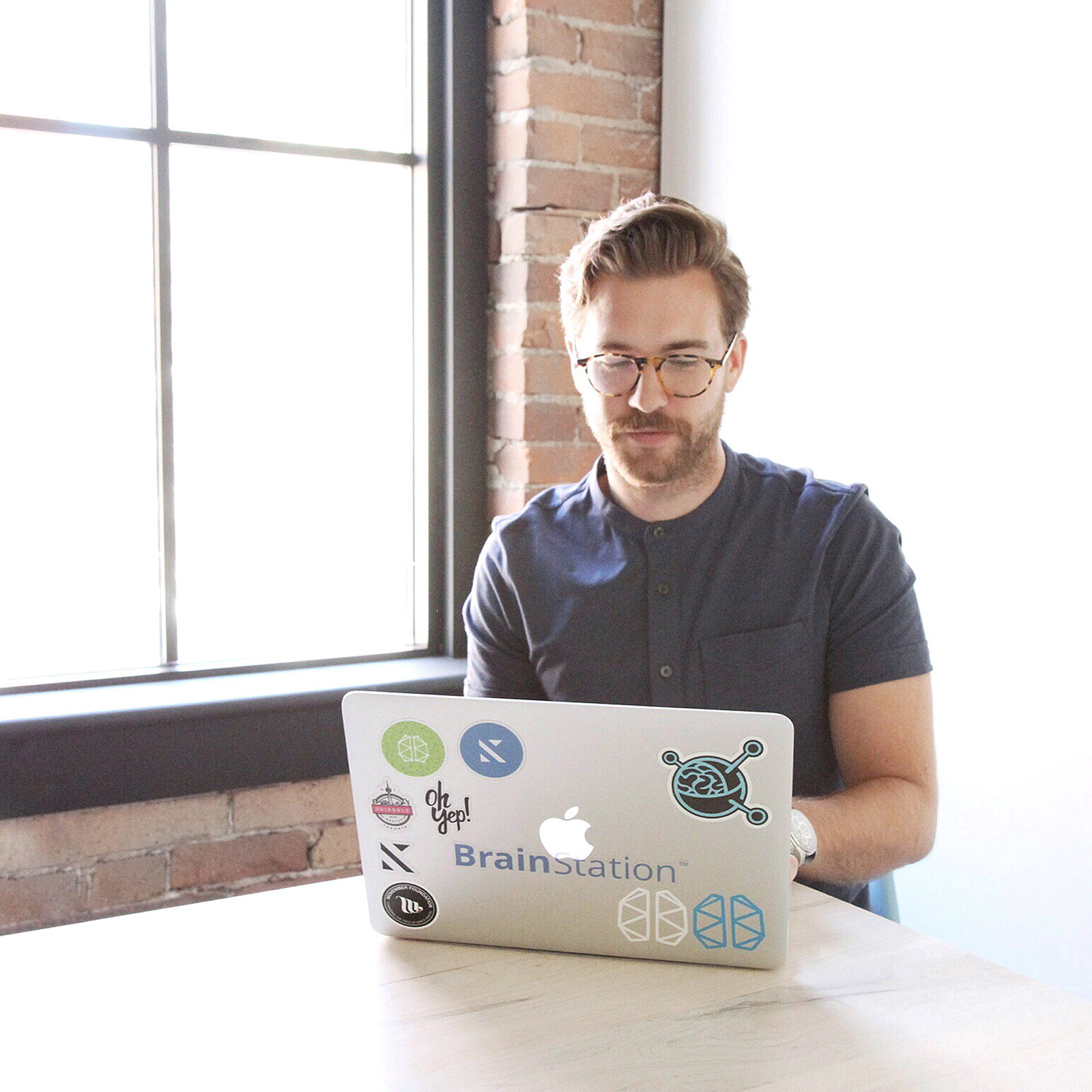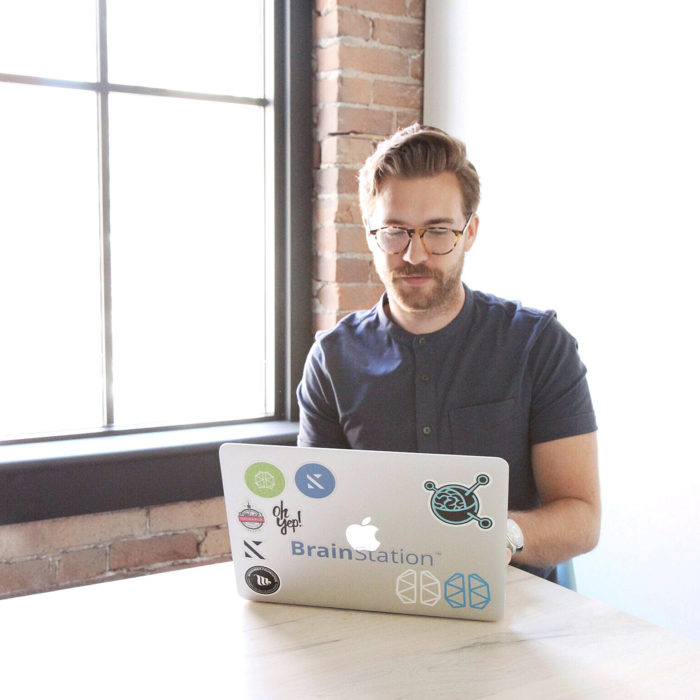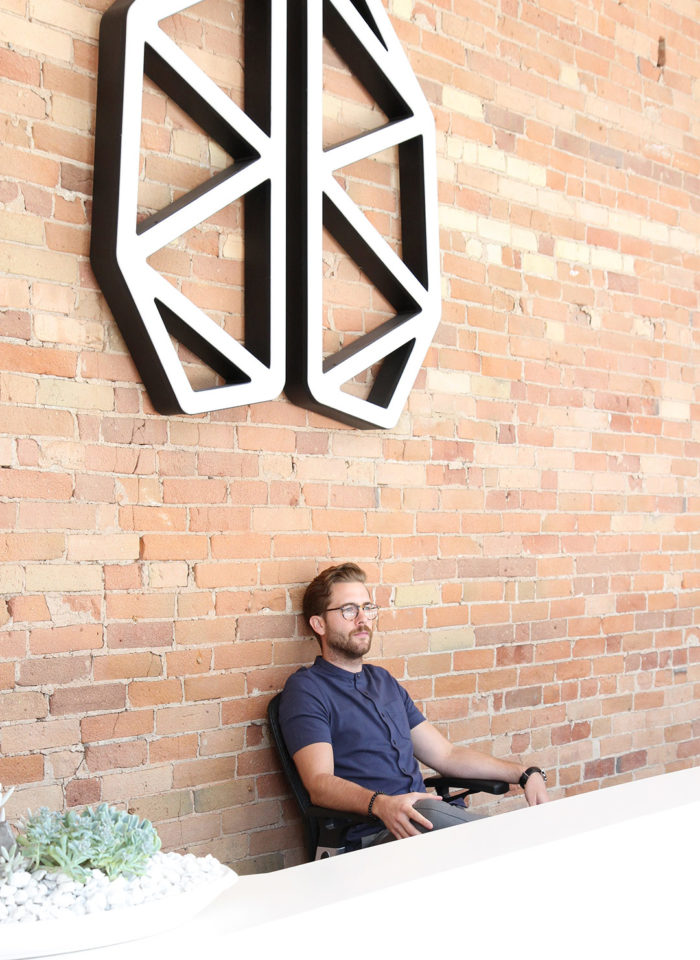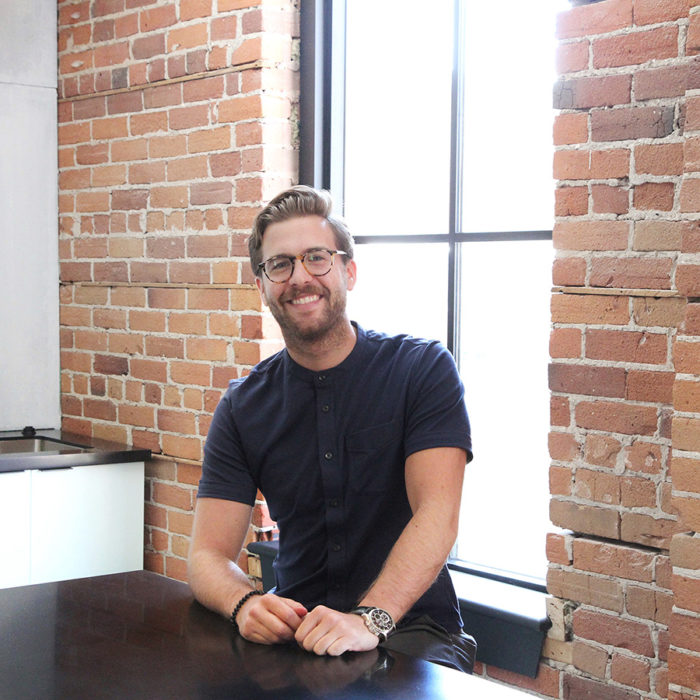If there’s one thing that Jason Field and I have in common, it’s that neither one of us knew what the hell we wanted to do after graduation.
A few weeks ago I met with the BrainStation founder to talk business at the company’s new Toronto headquarters at the corner of King and Spadina, a lofty, minimalist space that most locals had always known to be a backpacker’s hostel. A hub for progressive education that is powering the next generation of digital creators, BrainStation offers a learning space for people looking to grow their skills in everything from Web Development to Digital Marketing, but without having to sacrifice four years and loads of cash to get a degree.
Sitting down with Jason, I was so stoked to hear his story of how BrainStation came to be, how he grew this super cool digital community of learners and thinkers that now had campuses in cities across North and South America. What I didn’t expect to hear was a story that was anything but linear, a story relatable to so many of us who have no idea what we want to do with our lives, but have a driving desire to make an impact on the world. He was the definition of a renegade and proof that anything is possible.
Keep reading to find out how Jason took the road less travelled following graduation, how he launched a business with no money in the bank as his peers were on their third and fourth promotions, and how a chance encounter at Bonnaroo led to BrainStation going international.
________
Even though you founded this amazing education centre for technology, you actually went to school for business. Where did you find yourself after graduating with a business degree?
I think after graduating university, a big part of my journey was not knowing what I wanted to do. In my final year, I tried working for one of the big banks on their credit card accounts and I was nine-to-five, very corporate and in a cubicle – I quickly discovered that lifestyle just wasn’t for me.
I had peers who graduated at least knowing the industry they wanted to pursue, but I honestly had no idea. So instead, I paid off my student debt and saved enough money to get me to Beijing. I backpacked across Southeast Asia for three months and during that time, of course I was having fun and celebrating my first big adventure, but was also constantly thinking, “Where am I going to make my dent in the universe?” Backpacking was a big part of that adventure.
________
That feeling of not knowing what the hell to do after graduation is one I think a lot of people face. How did your post-grad travel adventures have an impact on that?
Travel – and backpacking specifically – makes you comfortable in your own skin. A lot of the skills you learn in school are analytical and theory-based, but being on the road and going from point A to point B with only what’s on your back, socializing and meeting people from different cultures? That is business at its finest. Your ability to network, to be compassionate towards people with different backgrounds and socioeconomic statuses – all of that counts, and as much as I didn’t jump into my career like my peers from university, I was essentially still training.
After your three months in Asia, did you head home to tackle the world of finance?
I actually didn’t! I was bitten by the travel bug. By that time I had figured out that athletic apparel was the industry I wanted to venture into – I found that the gear I was wearing was helping me to accomplish these outlandish goals of scaling the Great Wall of China or going on some epic hike, and I thought, “I can totally get behind that.” I realized if I went home, that market was all on the West Coast, but I wasn’t quite done yet. I had run out of money, but the two friends I was backpacking with wanted to go to Australia on a working visa, so we all applied and got them overnight and took off for Sydney.
I now only had $200 left in my bank account and was staying in a hostel with seven others who were just there to party. I had a credit card, so I could lean on that if I had to, but it was the largest challenge of my life – Brainstation included. By the time I got my first paycheque in Australia, I had $4,000 on my credit card, but ended up with a job at Lululemon.
________
Crazy that you landed in Australia only to work for a Canadian brand!
Haha yeah, I liked the grassroots marketing approach that Lululemon had, and I liked that I could have an impact at the store level and quickly moved my way up to a manager at the flagship store in Sydney. After six months my visa ran out but I really wanted to be involved in international growth and strategy, so I put it out there that I knew they were expanding to New Zealand and Asia, and within a week I was on a plane to Queenstown, where I joined the team to open up the first New Zealand store – another adventure for six months before deciding to actually come home.
________
What was it like coming home after that big adventure? Did you have a better idea of what career path you wanted to take?
Coming back home was great at first – I missed family and friends after being away for so long, and wanted to take at least six months to regroup and spend time with everyone. The intent was to then join the Lululemon head office in Vancouver, so I worked with a bunch of stores in Toronto and did some mens strategy work and community building, with the goal of moving out west in a few months’ time.
________
And what was that move to Vancouver like?
Oh, I didn’t go. We started Brainstation instead.
All of a sudden I had this opportunity – not to be the head of global strategy for someone else’s company in 10 years, but have that role within my own company from the start.
________
Wow, bit of a mic-drop moment! So how did the idea for BrainStation come about?
Well, when I moved home, I made the goal that I wanted to be head of global strategy at Lululemon in 10 years. I realized that if I wanted to reach that goal, I would need to know the digital space… and I just didn’t have the chops. I started to look into the basics of web development, but wanted options outside of learning on my own on the internet – I was looking for mentorship and feedback. I didn’t want to be a computer scientist or a programmer, so a full university degree wasn’t in the cards – I just wanted to lead authentically with a digital team.
So in 2012 with two friends, Duncan McCall and Apoorv Gupta, I decided to test out an Intro to Development workshop. With no marketing budget, we put it up on Meetup.com and made a Facebook page and all of a sudden 26 people had signed up. We had the space sponsored above The Hoxton and we had educators that wanted to just come out and mentor and teach, so there was no cost associated with it.
That was our test – without creating a website or paying for a space, we just put the feelers out to see if people actually wanted these workshops. Within a month we had done four of them and went from 26 people to 89. They came from similar walks of life – they were intimidated by technology and were searching for a way to learn skills in a social environment. As we started to grow, we expanded to different campuses, but it was still all very bush league – we didn’t have a head office or any overheads, so it was our laptops and just promoting on social networks.
________
It’s amazing how much you can do with just a laptop…
Seriously. We launched this company with just a laptop and a good idea and effectively built a school off of that, which is such a crazy thought.
________
How long was it until you actually started making money?
After the first months of workshops, we were good to go. I thought, “Sweet! I’m gonna do these workshops for two months and get a free education so I can lead a digital team at Lululemon.” As the business started to take off, that failed to happen because all of a sudden I had this opportunity – not to be the head of global strategy for someone else’s brand in 10 years, but have that role within my own company from the start.
In the second month of workshops, we started charging and it was just enough to get by, and I moved in with some friends who had a two bedroom plus den and lived there for two years (you can’t find many places in Toronto for $400 a month!). I went into some pretty big debt to get it off the ground, but always with the vision in mind that it would pay itself back. The business itself was making money, it just took awhile to get to the point of full salaries. Our educators were being paid and we were paying for the space and with each workshop we were getting better and better. When there was a bit extra, instead of taking it ourselves, we would try new marketing strategies, whether that was Facebook ads or printing costs for me to go to Union Station and hand out flyers.
In our eyes, the acquisition by Konrad Group wasn’t giving it up – it was like sending BrainStation to the moon.
________
It seems like the only place to go was up. You guys are now in cities across North and South America – how did that growth happen?
Well once we got past the point of scraping by and had campuses across Toronto in legitimate spaces, the next stage was pretty interesting…
I was at Bonnaroo Festival in Tennessee, watching the Arctic Monkeys with hundreds of thousands of people, and my group of Torontonians was stood next to another group of people from Toronto. I met this one guy Jake and he had just been picked up by a large consulting firm. He came from a traditional background, but needed to join the digital team and was stressed out because he didn’t know where to find this education without going back to school for a degree. So of course I told him about BrainStation, and within two weeks he emailed saying his firm was going to pay for two courses for him, which was huge for us at the time.
He also connected me with a digital consultancy firm called Konrad Group, and they loved the educational space and what we were doing. They wanted to help us refine our product and introduce courses they thought would trend very well with the Toronto market. It was great to now have this consultancy on our side who had a background in development and technology, and who wanted to be our big brother.
Many conversations later, Konrad Group acquired BrainStation and that empowereed us to benefit from their established infrastructure and take BrainStation international. We had people going from accounting into web development, from real estate and becoming technology consultants – it was all over the place. We were empowering people to become more digitally savvy, whether they wanted to go into that field or just expand their current role.
________
Was it tough to let go of something you had worked so hard to build up from scratch?
That acquisition was a big ego check. It was like, “Alright, we created this, are we okay with selling? Are we okay with giving this up?” But in our eyes, it wasn’t giving it up – it was like sending BrainStation to the moon. This is what is going to take our baby to the next level. If you are a true founder of something that is bigger than you, then you don’t care what it takes to push it forward.
Progress is not linear. It’s okay to stray from the line that you see in front of you – you’ll likely go below that line at some point, but you’re also positioning yourself to go above it.
________
Did you ever have moments starting up when you wanted to just throw in the towel?
Oh yeah. Ohhhhh yeah. I mean, I couldn’t afford rent for a few months even though it was only $400, plus my credit card bills started to rack up and I was paying interest. I was also seeing my peers and colleagues from school now on their third and fourth promotions, buying condos and houses, and I started to crave that stability. There were some months where I couldn’t pay for groceries and job opportunities were presenting themselves, but I just had to stay focused on what I believed in and that sometimes means turning down lucrative job offers.
________
Are there any major misconceptions about starting your own business?
That you have to be an expert in the market or business you’re looking to create. I don’t come from a technology background, but I created a business that revolves around digital. The dean of a university doesn’t necessarily know molecular biology – they know the business of bringing in students, providing education and managing finances. You can do whatever you want. You don’t need to be an expert, but you do need to learn the market. And if you can’t figure it out, you need to find people to pull into your network.
________
What’s been the most rewarding part of launching BrainStation?
The most rewarding part has definitely been the impact we’ve seen. Walking into a classroom where fourteen students are learning web development in Spanish in San Jose, Costa Rica is incredible. Also, just going to Vancouver and seeing that people actually know the brand and follow it actively. We hear all the time about the success stories of people who brought digital to their companies or that switched jobs to work for a more digitally savvy company or altogether quit their job and used their new skills to start up their own business. Hearing that there’s a business that grew out of BrainStation? That’s pretty cool.
________
And the toughest part?
Those earlier days of validating your concept, and even after validation, still second-guessing yourself. Because finances do matter. You can’t constantly chase something without money. So the harder times were when I had to dig deeper into debt just to buy groceries. But a lot of entrepreneurs go down that path and you just need to keep focused on the bigger picture.
________
Well, you’re proof that anything is possible if you stay focused and believe in what you have to offer. Any pieces of advice for aspiring renegades?
Just that progress is not linear. That’s something I always come back to. Had I left university and gone down the traditional path, there’s no way that I would have found myself in debt and in difficult positions, but I also wouldn’t have found myself at BrainStation. It’s okay to stray from the line that you see in front of you – you’ll likely go below that line at some point, but you’re also positioning yourself to go above it.
________
Check out the BrainStation website for more information and to enroll in a program,
and follow along on Instagram for daily updates!





Outstanding, and inspirational.
[…] Interview with the Founder of BrainStation, Jason Fields […]